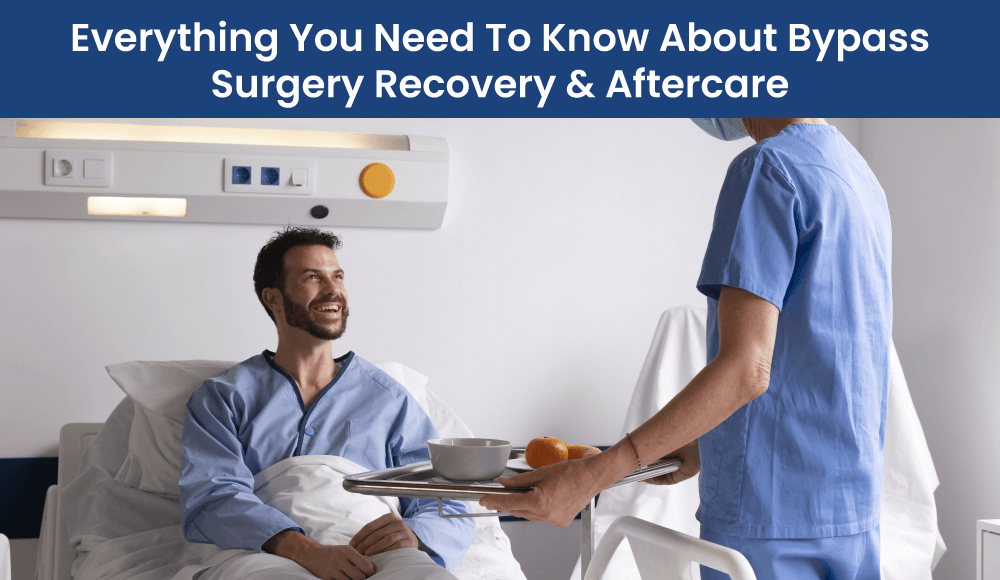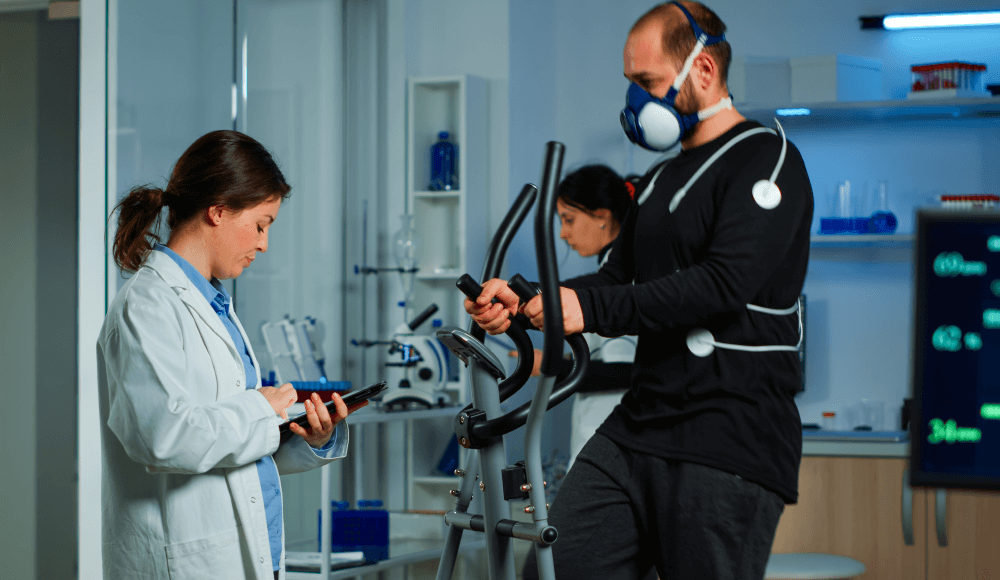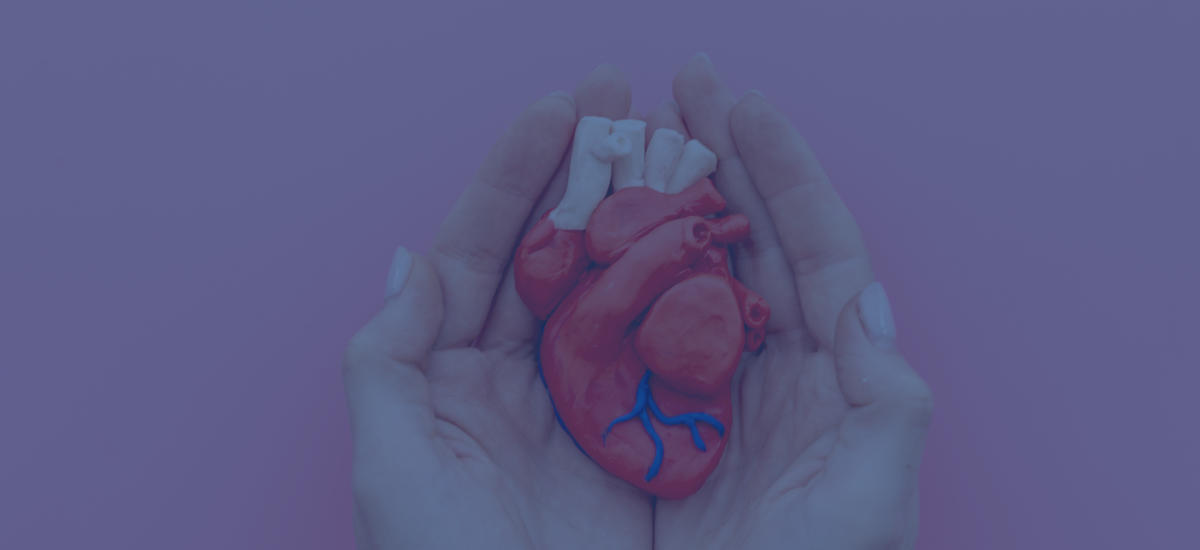A major medical procedure such as heart bypass surgery throws up many questions in patients’ minds. Apart from the surgery, they usually worry about whether they can lead normal lives after the procedure. The good news is that those who undergo a successful heart bypass and pass the first month without complications have a survival rate similar to the normal populace.
The recovery period varies depending on the type of surgery, the patient’s age, and general health condition. The heart bypass surgery recovery time is generally 3 to 4 weeks and patients can resume their normal activities after a month. It’s essential to make suitable lifestyle changes and take the medicines as prescribed to aid faster recovery.
Let’s now explore and demystify the topic to let you know everything about heart bypass recovery and aftercare.
Ready to recover stronger after your heart bypass surgery? Reach out to us now!
A] 5 Crucial Steps To Ensure A Successfully & SpeedyRecovery After Bypass Surgery
1. Follow Medical Team’s Advice
Your medical team will know your health condition better than any other person. It is important that you follow all the instructions ‘to the T’ to prevent any mishap while you are on the road to recovery. Please continue your heart, BP, diabetes, or any other medications. Do not stop them without consulting your doctor. Please feel free to reach out to them for any other health-related queries.
Follow-up visits are scheduled after bypass surgery to check the patient’s heart condition and other vital health parameters. Ensure that you never miss or postpone any of these appointments. Check out the guide for bypass surgery to get a comprehensive view.
2. Incorporate Physical Rehabilitations
Physical therapy and exercises are essential to regain your strength and facilitate faster recovery after bypass surgery. A structured cardiac rehabilitation program is beneficial to improve the functioning of your heart and lower the risk of post-surgery health complications.
Several low-impact exercises are recommended by medical professionals to strengthen your heart and enhance its ability to process oxygen. This includes walking, jogging, cycling, climbing stairs, and some light strength training.
The ideal frequency of exercising is five times a week. Every session can have a warm-up of 10 minutes, a workout for 15-20 minutes, and a cool-down for 10 minutes.
3. Prioritise Balanced Nutrition
It is necessary to shed your old eating habits and adopt a heart-healthy diet to reduce risk factors. Both obesity and diabetes are bad for your heart. A balanced & nutritious diet is key to managing your weight and controlling blood sugar levels.
Whole grains, moderate consumption of lean meat, fish, and healthy fats are typically recommended by dietitians. Sweets and alcohol must be avoided as they are high in calories. Fresh fruit juices and normal water can substitute sugary drinks. Low sodium intake can prevent the retention of fluids and lower blood pressure levels.
4. Curb Smoking
Cigarette smoking increases the risk of heart attacks and can prove to be fatal for heart patients. Stopping smoking can significantly reduce the risk of coronary heart disease even among healthy individuals. Several studies have reported that those who continued smoking after bypass surgery recovery faced nearly twice the risk of stroke, heart attack, and death as compared to non-smokers.
5. Embrace Long-Term Lifestyle Modification
The effects of heart surgery are not restricted to one organ. The procedure takes a huge toll on your entire body and mind too. It is essential to make suitable lifestyle changes to prevent major health problems later in life.
Healthy work-life balance, sound sleep, nutritious diet, regular exercise, and avoiding smoking can work wonders for heart patients on the recovery path. It is also important for people to prioritise their mental health to maintain robust heart health.
B] Navigating The Road To Heart Bypass Surgery Recovery: What Time To Expect
The heart bypass surgery recovery time can vary among individuals based on several factors. It can very well be over 2 months in the case of older patients and those having chronic medical conditions. However, the average recovery time is around 3 to 4 weeks.
After heart surgery, it is normal for people to have pain around the chest area and lack proper appetite for about a month. They may have incessant mood swings and struggle to get sound sleep at night. The first month can be quite tough with a general feeling of fatigue and shortness of breath. Things eventually begin to get better after 4-6 weeks.
While it’s important to stay active during the recovery phase, you must avoid intense physical activities. Do not exercise outdoors if the weather is extreme and do not stay in the same position for too long when you are indoors. You can probably start working after 2 months. You can safely avoid driving or travelling for at least a month after your surgery.
C] Unveiling The Top 5 Heart Bypass Surgery Myths
There are several myths about heart bypass surgery. Internet and social media compound the woes by making fake news go instantly viral and hyping them needlessly. Let’s now start debunking myths about heart bypass surgery.
Myth #1: Heart Surgery is Risky and Dangerous
With the latest advancements in medical science & technology, the risks have become minimal. Heart surgery is no longer fatal and top surgeons have a success rate as high as 99%. This surgery is far safer as compared to other surgical procedures.
Myth #2: Heart Surgery Can Cause a Brain Stroke
Earlier, some people had issues with brain functioning or the occurrence of stroke after a heart surgery. However, advanced surgical techniques and superior healthcare facilities have significantly reduced such risks. You can always discuss your specific problems with your doctors before opting for bypass surgery.
Myth #3: Heart Surgery is Not for the Young and Hearty
Heart ailments are no longer the misfortune of just aged folks. Stress, poor diet, sedentary lifestyle, and hereditary factors can make youngsters highly vulnerable to heart diseases. There have been many instances of people in their 20s and 30s suffering heart attacks.
Myth #4: Robotic Surgery is Always Preferable
This is not necessarily true. Robotic surgery is a minimally invasive procedure performed using high-precision robotic tools. It is relatively more expensive and has many advantages. But you do not always require robotic surgery to get good results.
Myth #5: Heart Surgery Can Prevent Any Heart Disease
A heart bypass surgery can definitely lower the risk of heart attacks in the future but does not completely eliminate them. A lot depends on your age, general health condition, and lifestyle factors. It is important to keep a close track of your heart health and take proper care to safeguard yourself after surgery.
D] Where can you find the Right Cardiac & Heart Bypass Surgeon in Mumbai for Your Bypass Surgery?
Choosing the right cardiac surgeon is the first step that you take toward making a full-fledged bypass surgery recovery. You must take sufficient time to examine the doctor’s credentials and experience. The surgeon’s expertise and track record matter most in dealing with major surgical complications and delivering favourable outcomes. The quality of medical facilities at the surgeon’s hospital is another important aspect for consideration.
A heart bypass surgery entails taking a healthy blood vessel from another body part to create a new pathway and restore the normal blood flow to your heart. The entire procedure lasts for around 3 to 6 hours and the recovery time is 2 to 3 weeks.
For more details, request an appointment with the best Heart Bypass Surgeon in Mumbai.
E] Post-Surgery Lifestyle Adjustments: A Key To Long-Term Health
A heart surgery is a great wake-up call to adopt a healthy lifestyle and reset your priorities. The time is now ripe to let go of anything that is not conducive to your overall health. Good food habits, avoiding smoking, sound sleep, regular physical exercises, and peace of mind are the key pillars of heart health. Take the medications as prescribed by your doctors and do not indulge in self-medication. Never miss the follow-up appointments that are crucial to monitor your heart’s condition.
Ready to recover stronger after your heart bypass surgery? Reach out to us now!
Conclusion
While you can take suitable preventive measures to avert a potential heart ailment, you have to be prepared to go under the knife if it’s inevitable. However, heart surgery is ineffective and redundant if you do not follow your medical team’s advice and incorporate healthy lifestyle habits subsequently.
Recovery after bypass surgery is fast, effective, and sustainable only if you take proper aftercare measures & precautions. A true change of heart may well be essential for a healthy heart. Contact Us now for any guidance and support in matters related to your heart.







[…] Quit Smoking and Limit Alcohol: Both can adversely impact heart health and slow recovery. […]